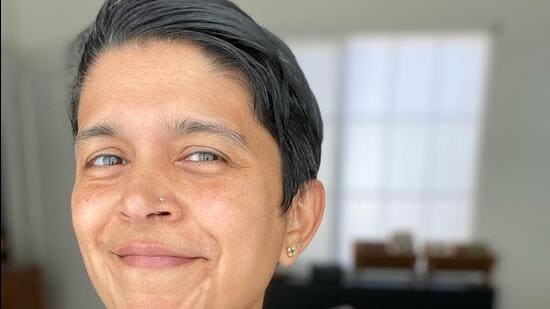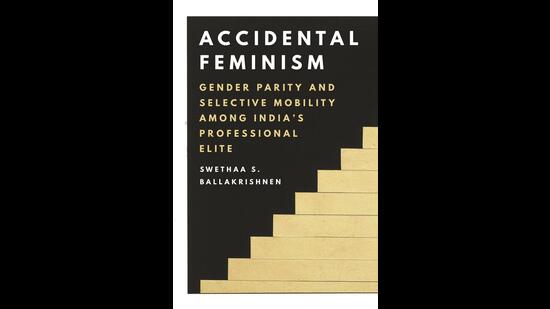Interview: Swethaa S Ballakrishnen, author, Accidental Feminism
The professor of law at the University of California-Irvine on their book which looks at how elite law firms offer an oasis for women within a hostile, predominantly male industry
In Accidental Feminism, you describe yourself as a “savarna feminist”. When and how did you develop the understanding that there are numerous feminisms, not a singular one?

I was well socialized by Kalpana Kannabiran, an amazing sociology professor, early in law school to come to concepts from several positionalities and to consider multiple logics of the same term. And I have since learnt from a line of scholars and activists that like any identity or framework of rights, to the extent feminism serves its inhabitants, it serves different people differently. Besides, so much savarna privilege is done by non-disclosure, so speaking to it directly as a lens and acknowledging it, felt necessary.
What are the implications of identifying as savarna in American academia?
I would like to think that there is momentum building to unmask the violence of caste politics within diasporic contexts, but it remains painfully slow. Indian scholars within the US academy like Anjali Arondekar have long summoned the urgency of caste in framing research and over the last few years, the work by civil rights organizations like Equality Labs and Dalit activists like Thenmozhi Soundararajan have been crucial to adding caste to conversations about anti-discrimination, especially in elite work contexts. But at the individual level, it is easy to ignore the blatant but invisible advantage of caste and its capital that buttresses navigation within American academia. I have lost count of the number of times I have heard a version of the qualification “caste does not really matter that much anymore.” Calling out and naming savarna identity, forces an outing of sorts, but its legibility to the institutions I am within might not always be clear without a longer explanation. And worst of all, just identifying without active solidarity or stating of anti-caste politics could be a posturing performance that continues to buffer my own advantage. In the book, I call this difficulty a kind of savarna fragility which makes speaking on behalf of caste as a forward caste academic in America ethically problematic both when it’s done and when it’s not done for different – yet interrelated – reasons.

What role did this identity play in choosing your subject and shaping your research questions? How did the process of writing this book transform your approach to caste capital?
Biography is an imminent coordinate for most, if not all, research. As I explain in the Methods appendix of my book, I entered the field as an older graduate student with years of experience being a lawyer across different jurisdictions, and these parts of my identity were crucial for framing questions about legal globalization and the movement of capital. But when I started writing the book from these data, it became more and more crucial to also place this within the larger frameworks of class and caste. Even if it was not a study that was initially designed to explore or report from direct interactions about these issues, and even if there were several generalizability and anonymity restrictions of the small sample that I was studying up, there were still ways to theorize at more meta levels – especially with case comparisons and attrition samples that this book draws on – about affective caste and class coordinates. It certainly was what made it urgently necessary to co-write my second book alongside it – Gender Regimes (with Kalpana Kannabiran, and published by Zubaan) – which kept these questions front and centre to the analysis.
How did you zero in on the elite professionals who eventually became part of the study?
The data was collected over a four-year period (2011-15), over which the initial set of respondents (n=28) introduced me to nodes in their networks that would eventually bring the sample to a comprehensive sub-set of the population of elite professionals I was interested in studying (n=139). As a lawyer I knew many of the people in the pilot sample through association and as an academic affiliated with a well-known institute for studying the legal profession (The Harvard Law School Center on the Legal Profession), there was certainly institutional legitimacy. The sample design and the comparative sub-populations that make the study analytically rigorous was also tremendously helped by exchanges with other scholars who were working together on the Harvard Globalization, Lawyers, Emerging Economies (GLEE) project that David Wilkins had invited me to be part of when this book was still at its most nascent stage.
What assumptions were you compelled to re-examine when you started your fieldwork?
The gender finding – that India’s elite transactional law firms have more women across levels of seniority than their comparative organizations both within the country and in other contexts – was not one I was expecting to find, certainly not within the context of the larger literatures on gender and work more generally, or the findings about gender (even for high educated, upper middle class, forward caste, urban women) in the country more specifically. Around the time that I was doing pilot interviews, there was a parallel lawyer demography study (by Ethan Michelson) which found that India and China were two of the least feminized legal professions in the world. Having this contrast brought to sharp relief what this project was about – following the data led for the project itself to become something else. Perhaps you can say that in this way, this project itself was accidental.
Based on your fieldwork, could you share why a number of women who enjoy “gender parity and selective mobility” in law firms choose to not identify as feminist? Do they see it as unsafe?
My book is not about identifying or choosing not to identify as a feminist. It was much more that it was not part of how they framed their positionality, and that its absence made me wonder about the theoretical possibilities of not-calling or naming something. As I start the book with a personal analogy, I suggest that the thing that ties together these narratives are a kind of blasé attitude of relative indifference to agentic movements or categories of membership. But that made me curious over the course of the decade that I sat with and wrote this book. Beyond empirics, as I state in my preface, the question framing the book is whether identities need intention to be claimed or whether lack of intention still does some work that is worth paying attention to. This question about whether intentional identity – or vocal membership – is exhaustive is a difficult one and I ask it with a lot of vulnerability about my own political commitments to intention, and reverence to the importance of the many intentional movements that continue to build alongside this.
How did you feel about being shortlisted for the Kamaladevi Chattopadhyay NIF Book Prize?
To have one’s ideas engaged with is an unbelievable privilege in itself, but to be alongside such a spectacular array of longlisted and shortlisted books is humbling. I’ve learnt so much from these authors and their projects, and I still cannot quite believe my voice gets to be held in the same category of honour.
You write about feeling conflicted about claiming categories and wearing the weight of your identities lightly. How did it happen? Would you call it weariness, evolution, or something else?
I think it’s a weary evolution, ha! The phrase “wearing my identities lightly” (which, thanks to your question I am thinking of as “w(r)earing”) was from a post-conference conversation over hot chocolate with my friend Oishik Sircar. We were talking about queer identities and I was explaining that I had started using gender neutral pronouns and had changed my identity markers, but that my relationship to queer projection was undergoing a change. His offering in that conversation – about identity as weight – has been a gift in the years since to think about middle age and the urgency of category markers. I live much more of a queer life of alterity now than I did a decade ago, but I also feel the need to vocally and urgently claim it less. So it is evolution and weariness, but a generous and generative reading is that it is also comfort and alignment with one’s praxis that allows for even heavy things to sit with more grace and ease. I write about some of this in an upcoming article about queer ethnographic bodies in the field and the distances between their performance and interiorities.
What are your thoughts on the fact that senior advocate Saurabh Kirpal’s elevation as a judge has been repeatedly rejected? (The Supreme Court has since reiterated its 2021 recommendation to appoint him as a judge). Would you consider this a form of institutionalized homophobia? His father was the Chief Justice of India but this fact did not seem to have helped his case. Are there limits then to savarna privilege, especially in the absence of marriage equality in India?
I think the non-elevation is a classic example of legitimized markers used to exclude minority actors or actors who are not “ideal” in some way who were always going to be excluded (until perhaps there was some institutional incentive to include them). This is how systems reproduce hierarchies. But while queerness complicates savarna privilege, it does not undo it.
Finally, I don’t know if marriage equality is where I would look to for an explanation of the limits on this privilege – the gender and relationship status of those who have approached the courts for this right are so diverse that it further highlights cis LGB privilege alongside other kinds of caste and class privilege. For a more fulfilling utopia, as Justice Chandrachud offers, we need more legal and social recognitions of the “atypical manifestations of the family unit”.
What are you currently working on?
In addition to several articles on identity and the legal profession (including one in honour of a dear friend, Deborah Rhode, who died last year, called Law School as Straight Space), colleagues and I recently got a large National Science Foundation grant to longitudinally study law student networks and relationships to observe the ways in which different kinds of capital reproduce professional hierarchies. In the Spring, I teach my yearly upper-level gender seminar GUILT (Gendered Understandings in Law and Legal Theory, which always is a source of such inspiration and exchange, so I am looking forward to that.
Chintan Girish Modi is a freelance writer, journalist and book reviewer.
All Access.
One Subscription.
Get 360° coverage—from daily headlines
to 100 year archives.



HT App & Website







